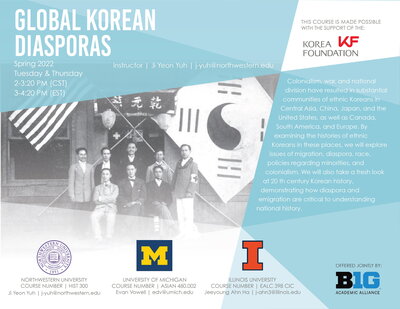
A selection of our Spring 2022 courses are introduced below. For a complete list of courses that are offered, please visit Course Explorer.
EALC 398 CIC | Global Korean Diasporas

Colonialism, war, and national division have resulted in substantial communities of ethnic Koreans in Central Asia, China, Japan, and the United States, as well as Canada, South America, and Europe. By examining the histories of ethnic Koreans in these places, we will explore issues of migration, diaspora, race, policies regarding minorities, and colonialism. We will also take a fresh look at 20th century Korean history, demonstrating how diaspora and emigration are critical to understanding national history. This class will be offered online via Big Ten Academic Alliance CourseShare (Northwestern University, taught by Prof. Ji-Yeon Yuh) and will be taught synchronously utilizing Zoom.
Time: TR 02:00 pm - 03:20 pm
EALC 398 BTA | Dating, Sex, and Marriage in South Korea
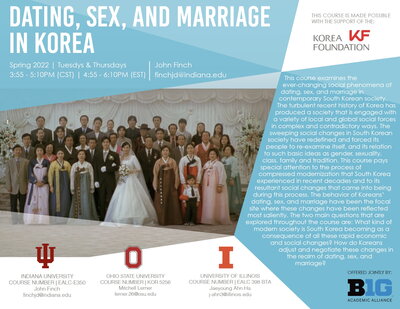
This course examines the ever-changing social phenomena of dating, sex, and marriage in contemporary South Korean society. The turbulent recent history of Korea has produced a society that is engaged with a variety of local and global social forces in complex and contradictory ways. The sweeping social changes in South Korean society have redefined and forced its people to re-examine itself, and its relation to such basic ideas as gender, sexuality, class, family and tradition. This course pays special attention to the process of compressed modernization that South Korea experienced in recent decades and to its resultant social changes that came into being during this process. The behavior of Koreans' dating, sex, and marriage have been the focal site where these changes have been reflected most saliently. The two main questions that are explored throughout the course are: What kind of modern society is South Korea becoming as a consequence of all these rapid economic and social changes? How do Koreans adjust and negotiate these changes in the realm of dating, sex, and marriage? This course will be offered online via BTAA CourseShare (Indiana University, Prof. John Finch) and will be taught synchronously utilizing Zoom.
Time: TR 03:55 pm - 05:10 pm
EALC 398 | Sacred Sites in Japan

This course aims at an interdisciplinary study of major sites in Japan that are deemed sacred, and of their visual culture. The types of sites to be studied include: imperial mausolea, capitals, Buddhist temples, Shinto shrines, palaces and warrior castles, tea houses, mountains, and parks. The course examines the art and architecture of sacred sites and positions them within a variety of contexts, such as their cultural, religious, and socio-political significance. Particular emphasis will be placed on the questions of how these art and architecture have been received and used and how they and perceptions of the sites shaped each other.
Instructor: Professor Naoko Gunji (ngunji@illinois.edu)
Time: TR 01:00 pm - 02:20 pm
EALC398/550 | Writers and Sino-Japanese Cultural Interaction 600-1900
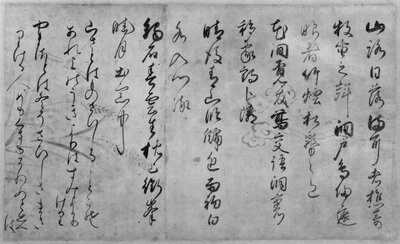
The course explores the intense cultural interaction between China and Japan from early times to the twentieth-century. For centuries before modernity, literary Chinese served as a shared literary language and as a lingua franca in scholarly and diplomatic exchanges between China, Japan, and Korea. Within Japan, Sinitic writing (kanbun) and Sinitic studies (kangaku) thrived as highly prestigious domains of culture. At the same time, proximity with China energized efforts to create distinct local cultures with unique traits. We will explore the roles of China and Sinitic culture in the biliterate, cosmopolitan milieu of premodern Japan. We will read writing in literary Chinese by Japanese authors, study changing representations of China and Japan at different points in time, and Chinese influences on vernacular works. In the second part of the course, we will explore how modernity and the encounter with the West disrupted existing hierarchies and reversed the flow of cultural influence between China and Japan. By delving deeply into the interconnectedness of premodern cultures, we question modern myths of cultural homogeneity.
Location and Time: G32 FLB F 2-5
Instructor: Gian-Piero Persiani (gp2029@illinois.edu)
CHIN 409 | Social Science Readings in Chinese
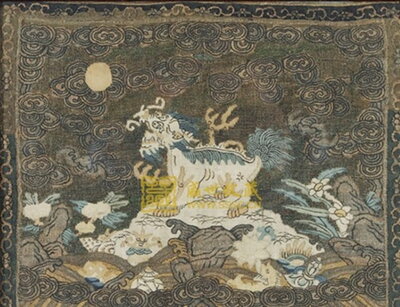
This course introduces students (including heritage students and Chinese native speakers) to scholarly readings and primary materials on modern and contemporary Chinese society. This year the course’s theme is Cultures of Law in China (1900s-present). Course materials include varied genres: literature, legal codes, academic writings, news reports, governmental documents, archival excerpts, as well as visual materials. Students will be trained in not only reading comprehension and vocabulary enhancement but also critical thinking, cross-disciplinary analysis, translation strategies and practices, as well as communication skills in putong hua needed for formal presentation and academic occasions.
Instructor: Professor SHAO Dan (danshao@illinois.edu)
Time: MW 10:00 am - 11:20 am
REL/EALC 495 | Seminar on Pure Land Buddhism
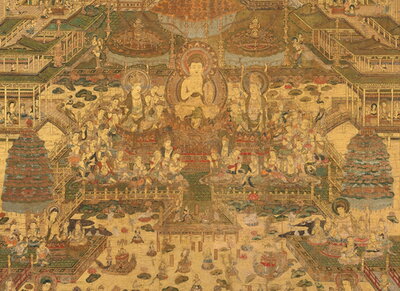
Across the Buddhist world, it is common to hear the chanting of the name of the Buddha of Infinite Light and Life and to encounter practitioners expressing their wish to be reborn in his paradisiacal Land of Bliss in the West, forever free from all forms of suffering. Who is this Buddha and how is the desire to be reborn in his Pure Land in keeping with the Buddhist teachings of renunciation, impermanence, meditation and enlightenment? Despite the widespread impact and significance of Pure Land Buddhism, it is widely unknown to western audiences and relatively understudied compared to that of other forms of Buddhism, such as Theravada, Zen and Tantric Buddhism. This course seeks to remedy that lack by exposing students to the rich doctrinal, literary, ritual and artistic traditions and practices associated with this popular devotional form of Buddhism and to familiarize them with the scholarly issues related to its study. Particular focus will be given to the varieties of Pure Land Buddhism that took shape in Japan.
Instructor: Professor Chris Callahan (ctc@illinois.edu)
Time: TH 05:00 pm - 07:50 pm
EALC 550 | Medical Humanities and Modern Japanese Culture
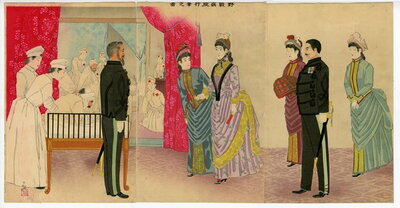
In this course, we look at the ways that Japanese have grappled with sickness and death throughout its modern history by examining works of literature (fiction, diaries, plays, and poetry), religious and philosophical texts, visual arts and film. While we will consider changing conceptions of the human body and different theories of the causes of disease, we will focus on how people have faced and written about suffering and loss throughout the ages and the role that medicine has played in assuaging their pain. This course offers students an introduction to a critical theme in literature and visual culture and to the field of medical humanities. It develops skills in close reading of texts and in the ability to analyze and to communicate complex ideas clearly and persuasively in discussion and in writing.
Instructor: Professor Robert Tierney (rtierney@illinois.edu)
Time: T 03:00 pm - 05:30 pm